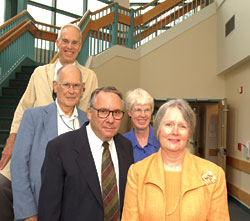Five new emeriti have lots of plans for their retirement
From building stone walls to tending family farms, the new emeritus members of DMS's faculty are keeping busy in retirement from their long service to the institution.
Allergists Frances and Harold Friedman provided allergy care for several decades to patients at DHMC as well as at outreach clinics throughout New Hampshire and Vermont. Both also enjoyed teaching medical students and residents. Their daughter, Elizabeth, a 1997 DMS graduate, continues the family tradition as an allergist in Rochester, N.Y.
Frances Friedman, M.D., an assistant professor of medicine, has been on the faculty since 1970 and "followed three previous generations in the field." She recalls with pleasure a time when a patient said her doctor had told her that "he was sending her to see Fran Friedman, who was 'the best.'"
She recently received a Laureate Award from the American College of Physicians (ACP). She's been governor of the New Hampshire ACP chapter and president of the New England Society of Allergy. "Now, in retirement, I am busy in my garden," she says. "I built a stone wall and a flagstone terrace."
Harold Friedman, M.D., an associate professor of medicine, joined the faculty in 1968 and continues to chair the DMS Admissions Committee. He expects to step down as chair in June 2004 but hopes to stay on as a member of the committee. He, too, has served as governor of the state ACP chapter and earned an ACP Laureate Award. In addition, he was recently made a Master of the ACP.

|
|
These recent retirees are, from the front, Hal and Fran Friedman,
Deb Holmes, Bill Mosenthal, and Charles Faulkner. |
William Mosenthal, M.D., a professor of anatomy and of surgery, retired from surgery in 1981 but wasn't ready to stop working— so he spent the next 22 years teaching anatomy. Now he's retiring again, but the 1938 Dartmouth College graduate expects to keep plenty busy—with family activities, gardening, and woodworking projects.
Since joining the faculty in 1948, Mosenthal has accomplished plenty, too. He reorganized surgical nursing and created a school for postgraduate training of OR nurses. In 1955, he established the first intensive care unit in the U.S.—at Hitchcock. He also "integrated basic surgical anatomic and physiologic knowledge into the clinical thinking of fourth-year students," he says. And he's taught students to "consider moral and ethical principles essential to proper surgical practice."
He is a three-time recipient of the fourth-year Basic Science Teaching Award. In addition, students created in his honor the Dartmouth-Mosenthal Surgical Society (in 1995) and the annual Mosenthal golf tournament (in 1985), the latter to raise funds for David's House, a residence for parents whose children are patients at DHMC.
Deborah Holmes, Ph.D., an assistant professor of medicine, joined the faculty in 1967. Although her Ph.D. is in cell biology, she's spent the last 20 years building up DHMC's continuing medical education for doctors, nurses, and other health-care professionals. She was appointed DHMC's first community health education coordinator in 1981, and she became director of its Center for Continuing Education in the Health Sciences in 1995. She attributes much of the program's success to institutional support for the importance of continuing education. "In many institutions, continuing education relies solely on tuition, community support, and grants," she says. Here, DHMC and DMS subsidize the program.
Her retirement plans include traveling in this country as well as abroad with her husband, Dartmouth biology professor Richard Holmes, Ph.D., an avian ecologist.
Charles Faulkner, M.D., an associate professor of pathology, has been on the faculty since 1969 and was director of autopsy services for many years. He plans to keep working part-time, doing clinical pathology and some teaching, at least until June of 2004. He has loved surgical pathology— "an exciting specialty, where diseases are diagnosed and treatments are determined based on pathologists' interpretations"— and has found it "gratifying to work with first-rate pathologists." He enjoys teaching medical students and appreciates having been able to teach as much as he wants. He is still a member of the DMS Admissions Committee, as he has been almost continuously since he came to Dartmouth.
He'll be plenty busy with other projects, too. He oversees a family property in southern New Hampshire that includes a managed forest, blueberry fields, and a cattle farm. He's also on the Hanover Planning Board and the board of the Society for the Protection of New Hampshire Forests. And he still finds time to sing in Dartmouth's Handel Society chorus, as well as to hike and bike.
Several additional new emeriti will be profiled in Dartmouth Medicine's Winter issue.
Laura Stephenson Carter
If you would like to offer any feedback about this article, we would welcome getting your comments at DartMed@Dartmouth.edu.
